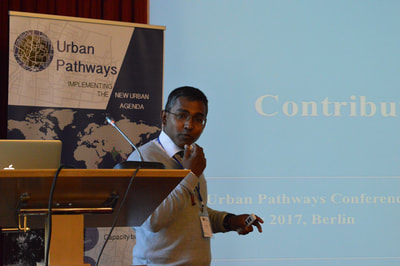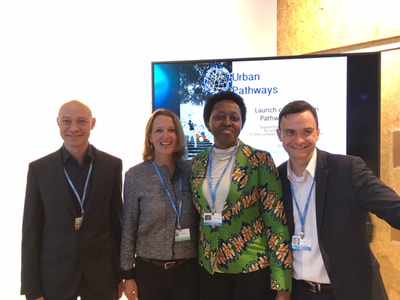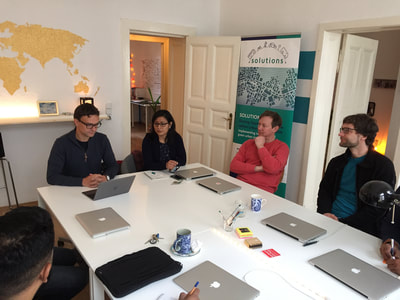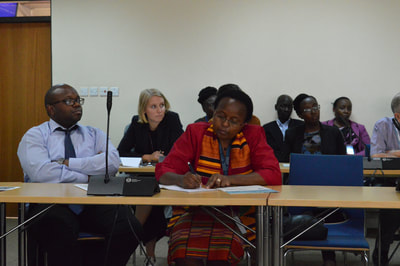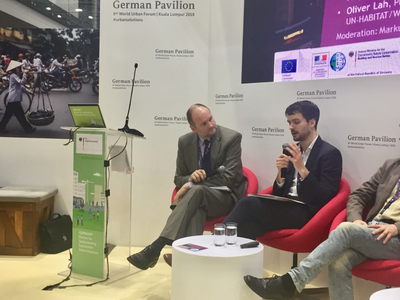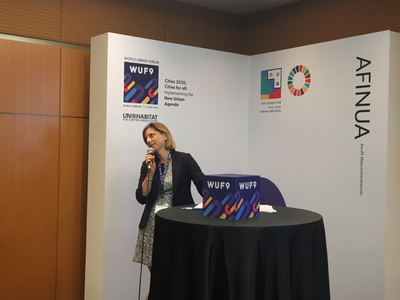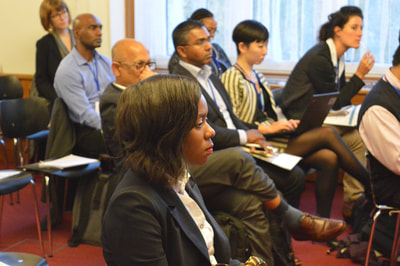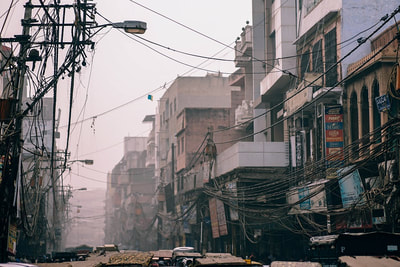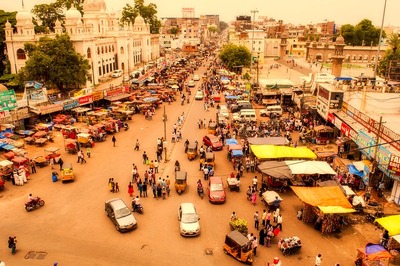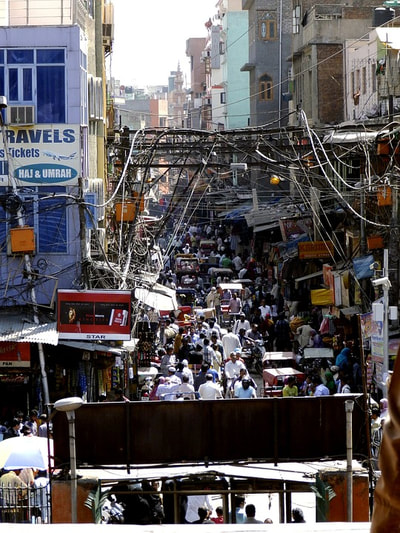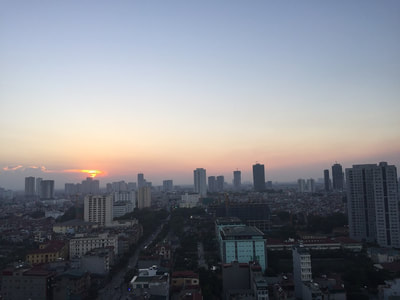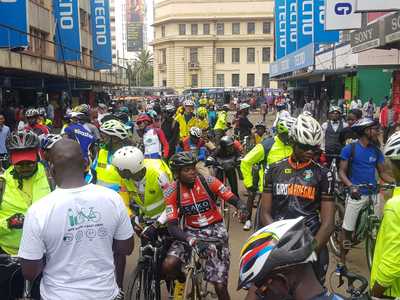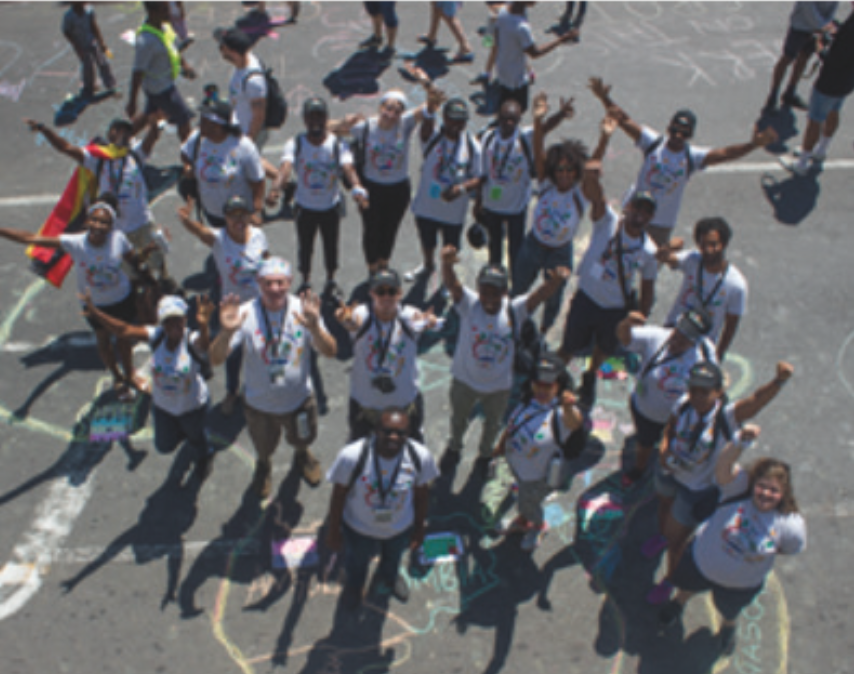Urban Pathways develops scalable pilot projects in cooperation with the partner cities at a neighbourhood level with an aim to provide a proof of concept of urban energy, mobility and waste management solutions.
Based on the pilot project demonstrators, larger-scale projects will be developed to utilise the CO2 mitigation potential of an integrated urban energy, mobility and resource management approach and seize the opportunities for contributions the Sustainable Development Goals. This will be done in close cooperation with finance partners and will be geared towards the Green Climate Fund, the Global Environment Facility and similar sources of funding and financing.
Based on the pilot project demonstrators, larger-scale projects will be developed to utilise the CO2 mitigation potential of an integrated urban energy, mobility and resource management approach and seize the opportunities for contributions the Sustainable Development Goals. This will be done in close cooperation with finance partners and will be geared towards the Green Climate Fund, the Global Environment Facility and similar sources of funding and financing.
Mobility projects
|
Urban Pathways e.g. co-organised Africa’s first ever exchange programme on “Open Streets”, which brought together African government officials, representatives of NGOs and street enthusiasts to learn from and share experiences on the concept of Open Streets and Placemaking in Cape Town, South Africa, from 22-28 October, 2018. The Open Streets Exchange was co-organised by Open Streets Cape Town (OSCT), Urban Pathways through UN-Habitat and GIZ through the Transformative Urban Mobility Initiative (TUMI) Challenge.
The participants represented countries from the African continent including Angola, Egypt, Ethiopia, Ghana, Kenya, South Africa, Uganda and Zambia. The programme provided a combination of dialogue sessions, interaction and practice on topics around planning, facilitating and implementing Open Streets initiatives. The participation at the Open Street Exchange inspired various city participants to initiative placemaking and car free initiatives in their home cities, such as in Ethiopia, South Africa and Uganda. |
Under the initiative EnvironMENTALISE –co-creating safe, friendly and green neighbourhoods’, launched by Urban Pathways in 2019, the project supported several actions happening in September and October during the Mobility Week, the Car-free Day and the Day of Walking and Cycling to School in cities in Latin America, Africa and Asia.
With the aim of monitoring the impacts of the implemented actions and collecting relevant data, Urban Pathways provided some of the participating cities with a low-cost air quality and noise-monitoring device, a ‘Smart Citizen Kit’. environMENTALISE started in August with a series of webinars related to active mobility and waste management with a strong bottom-up focus.
Children have been selected as the main target group of this type of projects, as it has been shown that working with children and schools has the potential to transform patterns in the short term, as it impacts their parents, and in the long term, through changes in their future mobility choices and waste habits.
With the aim of monitoring the impacts of the implemented actions and collecting relevant data, Urban Pathways provided some of the participating cities with a low-cost air quality and noise-monitoring device, a ‘Smart Citizen Kit’. environMENTALISE started in August with a series of webinars related to active mobility and waste management with a strong bottom-up focus.
Children have been selected as the main target group of this type of projects, as it has been shown that working with children and schools has the potential to transform patterns in the short term, as it impacts their parents, and in the long term, through changes in their future mobility choices and waste habits.
Implementation activities in UP partner cities:
- Belo Horizonte (Brazil)
- Hanoi (Vietnam) (planned 2020)
- Kochi (India) (planned 2020)
- Nairobi (Kenya)
- Kathmandu (Nepal)
- Pasig (Philippines) (planned 2020)
- Quito (Ecuador) (planned 2020)
- Addis Ababa (Ethiopia)
- Aguascalientes (México)
- Cuenca (Ecuador)
Integration of e-mobility in public transportation and waste collection
The Urban Pathways project has developed pilot concepts to enable transformational change towards sustainable urban mobility through innovative and integrated electric mobility solutions in passenger and freight transport. They are now being implemented in partner cities with support from the European Union in the context of the SOLUTIONSplus project. SOLUTIONSplus: Integrated Urban Electric Mobility Solutions in the Context of the Paris Agreement, the Sustainable Development Goals and the New Urban Agenda is a UP partner project funded by the EU Research and Innovation Programme, Horizon 2020. SOLUTIONSplus (SOL+) brings together highly committed cities, industry, research, implementing organisations and finance partners and establishes a global platform for shared, public and commercial e-mobility solutions to kick start the transition towards low-carbon urban mobility. The project encompasses city level demonstrations to test different types of innovative and integrated e-mobility solutions, complemented by a comprehensive toolbox, capacity development and replication activities.
Furthermore, the Urban Pathways project is currently working on project concepts regarding the integration of e-mobility solutions (e.g. electric three wheelers) in the waste collection system. While one use case can be to integrate it into municipal fleets and serve e.g. yet neglected areas (because of difficult access, narrow streets, etc.), another use case is testing for collection of new waste streams, such as organic waste from households.
Furthermore, the Urban Pathways project is currently working on project concepts regarding the integration of e-mobility solutions (e.g. electric three wheelers) in the waste collection system. While one use case can be to integrate it into municipal fleets and serve e.g. yet neglected areas (because of difficult access, narrow streets, etc.), another use case is testing for collection of new waste streams, such as organic waste from households.
Implementation activities in UP partner cities:
- Belo Horizonte
- Kochi
- Dar es Salaam
- Quito
- Hanoi
- Pasig
- Kigali
- Montevideo
Waste management
Managing waste properly is essential for building sustainable and livable cities, but it remains a challenge for many developing countries and cities. Effective waste management is expensive, often comprising 20%–50% of municipal budgets. Operating this essential municipal service requires integrated systems that are efficient, sustainable, and socially supported.
Therefore, within the area of resources, the Urban Pathway Project focuses on the needs to implement and improve waste management services in partner cities. The activities include supporting the engagement between strategic stakeholders to catalyze partnerships focused on technical issues and funding mechanisms – according to each municipality needs; and capacity building in regard to implementing comprehensive waste management strategies on the municipal level, taking into account the informal sector and the need to integrate formal and informal waste management activities. The UP team has been working closely with the partner cities municipalities to address the main challenges and opportunities that Global South face when it comes to waste management, as follows:
Therefore, within the area of resources, the Urban Pathway Project focuses on the needs to implement and improve waste management services in partner cities. The activities include supporting the engagement between strategic stakeholders to catalyze partnerships focused on technical issues and funding mechanisms – according to each municipality needs; and capacity building in regard to implementing comprehensive waste management strategies on the municipal level, taking into account the informal sector and the need to integrate formal and informal waste management activities. The UP team has been working closely with the partner cities municipalities to address the main challenges and opportunities that Global South face when it comes to waste management, as follows:
Source separation and decentralized solutions pilots
In order to increase separate collection and recycling of solid waste - and implement a circular economy approach - the Urban Pathways project supports local-level decentralized waste management initiatives with implementation of awareness raising programmes and neighbourhood-based pilot projects. These pilots range from community-based programs that promotes the recycling of electronic and electrical waste (“reciclatrón”), incentives for collection of recyclables (e.g. “swap market” - where, partnering with businesses and local farmers neighbours bring their recyclables and get fresh products in return) or engagement of public schools on waste segregation, composting and urban gardens - as children play a critical role on awareness raising as young multiplying local agents.
Implementation activities in UP partner cities:
In order to increase separate collection and recycling of solid waste - and implement a circular economy approach - the Urban Pathways project supports local-level decentralized waste management initiatives with implementation of awareness raising programmes and neighbourhood-based pilot projects. These pilots range from community-based programs that promotes the recycling of electronic and electrical waste (“reciclatrón”), incentives for collection of recyclables (e.g. “swap market” - where, partnering with businesses and local farmers neighbours bring their recyclables and get fresh products in return) or engagement of public schools on waste segregation, composting and urban gardens - as children play a critical role on awareness raising as young multiplying local agents.
Implementation activities in UP partner cities:
- Belo Horizonte (planned 2020)
- Hanoi (planned 2020)
- Kochi (planned 2020)
- Kigali (planned 2020)
- Quito (planned 2020)
Reducing food waste pilots
In order to lift the potential for GHG emissions reduction of the food sector (contributing 15 to 31% of total GHG emissions) the Urban Pathways project is focusing on developing and implementing source-focused prevention strategy as one element of reducing organic waste. This includes awareness raising activities and small pilots with businesses and restaurants to incentivise consumers to take their leftovers, rather than throwing it away.
Implementation activities in UP partner cities:
In order to lift the potential for GHG emissions reduction of the food sector (contributing 15 to 31% of total GHG emissions) the Urban Pathways project is focusing on developing and implementing source-focused prevention strategy as one element of reducing organic waste. This includes awareness raising activities and small pilots with businesses and restaurants to incentivise consumers to take their leftovers, rather than throwing it away.
Implementation activities in UP partner cities:
- Belo Horizonte (planned)
- Kochi (planned)
- Kigali (planned)
- Quito (planned)
Organic Waste Treatment pilots (household, businesses, communities)
Apart from reducing food waste (above) the Urban Pathways projects focus especially on organic waste - as this makes up for the biggest fraction of waste in most of the UP partner cities. Only few of the partner cities do have composting plants at all; those that do have plants are targeting big generators. This is why the Urban Pathways project plans to focus on household level composting, implement pilot programmes with schools, in neighbour- hoods and also businesses - partnering with the municipalities and local NGOs, that recently started bottom-up initiatives for composting activities. Where possible it is planned to link the waste activities with the active mobility pilots, e.g. on placemaking (see EcoZone concept below)
Apart from reducing food waste (above) the Urban Pathways projects focus especially on organic waste - as this makes up for the biggest fraction of waste in most of the UP partner cities. Only few of the partner cities do have composting plants at all; those that do have plants are targeting big generators. This is why the Urban Pathways project plans to focus on household level composting, implement pilot programmes with schools, in neighbour- hoods and also businesses - partnering with the municipalities and local NGOs, that recently started bottom-up initiatives for composting activities. Where possible it is planned to link the waste activities with the active mobility pilots, e.g. on placemaking (see EcoZone concept below)
Implementation activities in UP partner cities:
- Belo Horizonte
- Kochi (planned 2020)
- Kigali (planned 2020)
- Quito
Energy
Regarding pilot activities in the energy sector, Urban Pathway has addressed energy issues in a broader perspec- tive, focussing on improved vehicle efficiency (EVs) (see section on mobility above) and reducing energy efficiency through building energy efficient housing. For the latter, demonstration projects on low cost housing (tiny houses) are developed and implemented, considering also slum upgrading intervention in the respective cities. Its design measures include passive measures (proper heating/cooling, lighting and natural ventilation) and installed PVs that saves operational energy use, as well as use of sustainable local materials contributing to reduced total life cycle energy cost. It is built on a self- build construction concept, supporting and increasing local capacities.
Implementation activities in UP partner cities:
- Nairobi
- Kigali (planned 2020)
- Kathmandu
- Pasig
- Kigali
- Dar es Salaam
- Montevideo
- Quito
Integrated Urban Design: EcoZones as cross sectoral framwork
EcoZones have been developed as a framework to highlight the sectoral linkages and opportunities for synergies across key sectors. Urban Pathways is currently supporting small, low-cost projects that focus on neighbourhoods as the geographical scale, where an intersectoral approach is easily applicable, addressing simultaneously mobility, energy and waste issues through a series of activities that include tactical urbanism, awareness-raising, community participation and impact assessment.
Understanding that the transition to a sustainable urban development is not only about infrastructure, but that a mindset change plays a huge role, the involvement of the community in these projects is key. Thus, these pilots
will use participatory methodologies to increase support for sustainable mobility modes, transform public spaces, promote clean streets and waste reduction and separation. Their approach seeks to empower neighbours to have an impact in the change in their community, raise awareness and increase the collective knowledge on sustainable urban development and environmental issues. Thus, these projects do not only carry out pilot sustainable mobili-
ty and/or waste projects (with a great potential of including further areas such as NBS); they also empower local communities, raise awareness and promote social cohesion. Within the EcoZone concept the Urban Pathways team together with the partner cities are combining the activities that are described above, e.g. on active mobility projects and public space and composting & separation at source pilots.
Understanding that the transition to a sustainable urban development is not only about infrastructure, but that a mindset change plays a huge role, the involvement of the community in these projects is key. Thus, these pilots
will use participatory methodologies to increase support for sustainable mobility modes, transform public spaces, promote clean streets and waste reduction and separation. Their approach seeks to empower neighbours to have an impact in the change in their community, raise awareness and increase the collective knowledge on sustainable urban development and environmental issues. Thus, these projects do not only carry out pilot sustainable mobili-
ty and/or waste projects (with a great potential of including further areas such as NBS); they also empower local communities, raise awareness and promote social cohesion. Within the EcoZone concept the Urban Pathways team together with the partner cities are combining the activities that are described above, e.g. on active mobility projects and public space and composting & separation at source pilots.
Implementation activities in UP partner cities:
- Quito (two neighbourhoods)
- Belo Horizonte
- Kochi - planned 2020
- Kigali - planned 2020
Capacity Buidling & Awareness Raising
Capacity building and awareness raising have been one of the pillars in the implementation activities of Urban Pa- thways. All projects have been accompanied by webinar series that provided the local counterparts with necessary elements for a successful implementation with a strong focus on peer-to-peer exchange between cities and local initiatives in similar contexts. UP has organised several webinars in English, Spanish, Portuguese and French with the aim of reaching a wider audience. Among the topics that have been addressed are:
- Low-carbon mobility solutions
- EcoDistricts
- Air quality monitoring
- Organic waste
- Active mobility
- Tactical urbanism
- Economic opportunities of waste
Monitoring and Evaluation
KPIs
Impact assessment is key to measure the continuous improvement of the urban environment as well as the positive and negative impacts which will determine the need to improve, rethink and redesign the urban space in order to maintain its integrity and resilience. For each pilot and demonstration actions, cross-cutting KPIs were established, which will be consolidated after the implementation and therefore disclosed on the final report, highlighting the economic, social and environmental benefits/impacts.
The KPIs are suggested as follow:
Impact assessment is key to measure the continuous improvement of the urban environment as well as the positive and negative impacts which will determine the need to improve, rethink and redesign the urban space in order to maintain its integrity and resilience. For each pilot and demonstration actions, cross-cutting KPIs were established, which will be consolidated after the implementation and therefore disclosed on the final report, highlighting the economic, social and environmental benefits/impacts.
The KPIs are suggested as follow:
- GHG emissions (tCO2e)
- Number of traffic accidents
- Cost efficiency
- Walkability •
- Well-being (community assessments) •
- Air quality and noise monitoring using low-cost and easy-to-use sensors
- Number of people/families/households impacted
- Number of community-based adaptation activities implemented
- Micro mobility (Bicycle and pedestrian counts / Vehicle counts /
GHG emissions calculations
In order to illustrate the impact potential of Urban Pathways with regards to climate change mitigation, this report includes the preliminary results of the estimated direct CO2 emissions reductions of the majority of implemented and planned projects - for Scope 1, considering the emission sources located within the cities boundaries. The ac- countability of reduced and avoided emissions observed the following criteria:
In order to illustrate the impact potential of Urban Pathways with regards to climate change mitigation, this report includes the preliminary results of the estimated direct CO2 emissions reductions of the majority of implemented and planned projects - for Scope 1, considering the emission sources located within the cities boundaries. The ac- countability of reduced and avoided emissions observed the following criteria:
- Unit: tCO2 / year
- Period: 1 year
- Local criteria: when available, city-level data were used to increase the accuracy, for instance: temperature,
precipitation, waste composition, type of landfill (if methane is recovered from solid waste, the value for CH4
fraction in biogas applied was the IPCC, 2006 default). - Emission factors: it was considered a variety of local, national or default data to increase consistency.
Moreover, when available, regional emission factors were applied. - It‘s important to highlight that GHG emissions from waste disposal occur for more than 30 years after their
disposal due to the degradation profile of organic matter in landfills. Therefore the projection considers the sum of the emissions up to 2048. Moreover, the emissions from low carbon solutions for the waste collection were not considered, as the pilots are still being designed. - In the case of mobility-related activities, it is worth noting that only direct GHG emissions for the reduction of vehicle kilometers travelled (VKT) in the intervened area were taken into account. Modal shift potential as well as the rerouting of vehicles around the intervened area have not been considered in these calculations, but will be included in the next UP report.
Air Quality sensing powered by Citizen Science
Air pollution affects all regions of the world. However, populations in low-income cities are the most impacted. Ac- cording to the latest air quality database, 97% of cities in low- and middle- income countries with more than 100,000 inhabitants do not meet WHO air quality guidelines. The associated health impacts of this reality are scary. As air quality declines, the risk of stroke, heart disease, lung cancer, and chronic and acute respiratory diseases, including asthma, increases for the people who live in them. However, most cities in developing countries have poor or inex- istent air quality monitoring systems. This has been due mostly to the high prices and sophistication of air quality monitoring devices.
Low-cost and easy-to-use measuring devices for air quality determinants and noise have become available. Under- standing the limitations of these type of devices in comparison to high-end exemplars regarding data accuracy and coverage, they could become an powerful way of collecting data and involving the local population while doing it.
In this context, a partnership with Open-seneca, a UK-based organisation, whose goal is to transfer knowledge on how to build open-source sensor hardware to raise awareness and initiate a behavioural change among local com- munities has been established. Open-seneca uses affordable, off-the-shelf particulate matter sensors, geo loca- tion, and wireless transmission modules for their devices. The collected data is displayed on dynamic maps on their online platform for identification of pollution hotspots. The sensor design is co-creation-based and tailored to local requirements to achieve a globally compatible and locally appropriate sensor.
Air pollution affects all regions of the world. However, populations in low-income cities are the most impacted. Ac- cording to the latest air quality database, 97% of cities in low- and middle- income countries with more than 100,000 inhabitants do not meet WHO air quality guidelines. The associated health impacts of this reality are scary. As air quality declines, the risk of stroke, heart disease, lung cancer, and chronic and acute respiratory diseases, including asthma, increases for the people who live in them. However, most cities in developing countries have poor or inex- istent air quality monitoring systems. This has been due mostly to the high prices and sophistication of air quality monitoring devices.
Low-cost and easy-to-use measuring devices for air quality determinants and noise have become available. Under- standing the limitations of these type of devices in comparison to high-end exemplars regarding data accuracy and coverage, they could become an powerful way of collecting data and involving the local population while doing it.
In this context, a partnership with Open-seneca, a UK-based organisation, whose goal is to transfer knowledge on how to build open-source sensor hardware to raise awareness and initiate a behavioural change among local com- munities has been established. Open-seneca uses affordable, off-the-shelf particulate matter sensors, geo loca- tion, and wireless transmission modules for their devices. The collected data is displayed on dynamic maps on their online platform for identification of pollution hotspots. The sensor design is co-creation-based and tailored to local requirements to achieve a globally compatible and locally appropriate sensor.
Urban Air Action platform – the World’s largest platform for air quality data
The Urban Pathways partnership, through the United Nations Environment Programme (UNEP), together with UN-Habitat and IQAir, a Swiss air quality technology company, launched the world’s largest air quality data platform during the tenth World Urban Forum in Abu Dhabi in February 2020, bringing together real-time air pollution data from over 4,000 contributors, including ci- tizens, communities, governments and the private sector to work towards healthier, more sustainable cities. This partnership – currently reaching over 15 million users and
covering more than 7,000 cities worldwide – aims to sustain and grow the world’s foremost air quality databank. The data, shared on a single, UN-coordinated platform, will empower governments to take action to improve policy, allow citizens to make more informed health choices and demand action from their governments, while giving busi- nesses the ability to make investment decisions that promote a cleaner, greener environment.
The platform addresses the global air quality information gap by bringing together data collected by governments, NGOs, companies and local community groups and individuals.
Link to the platform: https://www.unenvironment.org/explore-topics/air/what-we-do/monitoring-air-quality/urban- air-action-platform
The Urban Pathways partnership, through the United Nations Environment Programme (UNEP), together with UN-Habitat and IQAir, a Swiss air quality technology company, launched the world’s largest air quality data platform during the tenth World Urban Forum in Abu Dhabi in February 2020, bringing together real-time air pollution data from over 4,000 contributors, including ci- tizens, communities, governments and the private sector to work towards healthier, more sustainable cities. This partnership – currently reaching over 15 million users and
covering more than 7,000 cities worldwide – aims to sustain and grow the world’s foremost air quality databank. The data, shared on a single, UN-coordinated platform, will empower governments to take action to improve policy, allow citizens to make more informed health choices and demand action from their governments, while giving busi- nesses the ability to make investment decisions that promote a cleaner, greener environment.
The platform addresses the global air quality information gap by bringing together data collected by governments, NGOs, companies and local community groups and individuals.
Link to the platform: https://www.unenvironment.org/explore-topics/air/what-we-do/monitoring-air-quality/urban- air-action-platform
Women’s Safety Audit (WSA)
Women account for 50% of the world‘s population. Accordingly, not including women in decision making processes, design processes and understanding their needs, would continue to limit the potential of sustainability transitions. One key example of that is mobility. The use of NMT is definitely biased by gender. If we do not understand that women face other problems, have different needs than men when it comes to riding a bike or walking on the street, women will not be motivated to join the NMT community, limiting significantly the potential of modal shift and its related, social, economic and environmental benefits.
In this context, UP has introduced the Women‘s Safety Audit (WSA) as one of the assessments to be conducted in its implementation activities, mainly related to active mobility and public space occupancy. WSA is a participatory methodology designed to: (1) provide detailed information on issues related to women‘s safety within a given space; (2) generate recommendations for improvement; and (3) empower women to work with local decision makers for positive change in the community.
Women account for 50% of the world‘s population. Accordingly, not including women in decision making processes, design processes and understanding their needs, would continue to limit the potential of sustainability transitions. One key example of that is mobility. The use of NMT is definitely biased by gender. If we do not understand that women face other problems, have different needs than men when it comes to riding a bike or walking on the street, women will not be motivated to join the NMT community, limiting significantly the potential of modal shift and its related, social, economic and environmental benefits.
In this context, UP has introduced the Women‘s Safety Audit (WSA) as one of the assessments to be conducted in its implementation activities, mainly related to active mobility and public space occupancy. WSA is a participatory methodology designed to: (1) provide detailed information on issues related to women‘s safety within a given space; (2) generate recommendations for improvement; and (3) empower women to work with local decision makers for positive change in the community.

